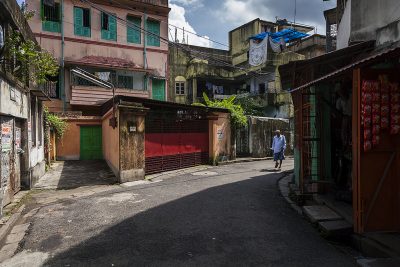By
Rinita Banerjee
House number 23, Rippon Street, Kolkata.
The house was the shape of a box. Square, two-storied. The outside was a deep blue color. The walls beside the door on the ground floor, extending on to the outer boundaries of the terrace on the floor above, and the door – a denim blue, except the knob. Made of brass, it was a knob like knobs are – a round bulge that could be turned only towards the right, but it was not an ordinary knob. It held a key to a tale.
The denim blue shade resembled the trousers that fifty-eight-year-old Ananta wore every day. One does not know if the pair was repeated. Not since his wife passed away thirty-six days back. She was fifty-two. But the trousers he was seen in, whenever he was seen, outside his house, was the blue of the house walls.
Ananta’s only son had died. He was ten when he had been diagnosed with an inoperable brain tumor. It was a matter of months – seven, to be precise. Seven long months. Fifty-two-yearold Sunetra had not suffered from such a protraction. She had had a heart condition. One morning, Ananta had not woken up to Mittens’ voice asking him to share her tea with her. Tea, with four pieces of toasted, white bread – two for Ano, two for her. Ananta had not witnessed the heavy breathing, the pain, the paralysis that had afflicted her muscles for a few minutes while the heart had stopped pumping blood to her brain. He had slept deeply, peacefully, like every other day. He had, upon staring at Mittens’s still frame in the morning, a mere corpse by then, seen life disappear like light from a snuffed-out candle. And then, he had seen the smoke, rising slowly, swaying in a measured manner like a coy, dexterous belly-dancer’s waist. The smoke-like soul. White for a while, and then a color called nowhere. Ananta did not know where it had gone. The windows were shut at the time. Mittens’ soul must have stayed in the room where he had spent “thirteen years plus seven months plus twenty years plus a few days” with her – Ananta guessed.
Ananta called Sunetra, Mittens. Those warm, finger-less gloves one wore during winters? One night, a few months after they had been married, Ananta had woken Mittens up and told her that that is what he would call her. Hearing that Sunetra had burst out laughing, her laughter like a gust of strong wind. And then, as if impeded by the window that needs to shut the wind from causing tumult in a settled chamber of heart and hearth, her words had replaced the sweet roar, the laughter. It sounded like a name one should give to a cat, she had told Ananta with her large, deep brown eyes grown larger and rounder in utter surprise. Round as the knob, brown like one of the browns on toasted bread. Ananta had shaken his head, called her “Mittens” again, kissed her somewhere between her right eyebrow and her right eye, a slight peck, turned on his back to the other side, and slept. Mittens had turned red – a burning glow concentrating at the centers of both her cheeks. It was unreasonable – the name. But so was Ano’s warmth towards her. As fuzzy as mittens. She had turned to the other side, not facing Ano, curling like the edge of a sheet of paper burning in a tender fire, eyes closed in anticipation of, well – anticipation.
Inside the house, Ananta would often look up towards the ceiling. The smoke must have risen and spread across the ceiling – also blue. The white sheets of paper with thin blue rules that blocked out the single window in his room and even the walls, had helped keep it back – the smokelike soul. Ananta would not lose it like Rono’s, his son’s. He had promised himself.
Ananta believed in promises. Keeping them. As for promises, who could tell?
Back from his infrequent, unaimed walks, Ananta would often sit on his wooden rocking chair – a wedding gift from Mittens’ Aunt – facing the paper-covered window. He would look at the small pot plant kept on the sill of the silent window, on the left. It was growing – the plant, he didn’t know what it was.
Then, one day: It had been raining for hours. Pouring. Ananta had returned from one of his walks, drenched, his lean frame despairing in the wretched wetness that made the shirt and trousers cling to his body. Reaching his room he had rushed towards the plant. It had grown taller, suddenly, the leaves on it a ripe, bright, fresh parrot-green, the veins on each leaf pulsating, thrumming with a heart-like beat, and they were pushing at the paper, pushing hard, very hard. Ananta could not hold the branches back. Where had it all this strength from? He could not even move the pot from the sill. It had become too heavy for him to lift. But it was small. The same as what he had seen the previous day. He was panting. The beads of sweat on his brow mixed with the blue that was dripping from his damp hair. The paper had begun to tear. It could not withstand the pointed tips of the unbending, iron-willed branches. Even the leaves were unyielding. Cruel! Cruel leaves!
Ananta watched in horror. Not only was the paper ripping apart in several places but the branches of that once-small, quaint plant were reaching for the walls and up to the ceiling. The branches, like slithering spineless serpents moved effortlessly to every corner of the room, its walls, the ceiling. Their mouths gaping with webs of saliva – like the patterns inside of a kaleidoscope – seemed to breathe something in, inhale some invisible potion, the surreptitious existence of which they had come to know. Cruel, unfeeling beasts, these snakes!
Tears streamed down Ananta’s face, their ends accumulating in a transparent, bulbous pit at some point on his bony jaw-lines. The pits grew in number, shaking a little, about to fall, to keep on falling. He sat, his legs spread, by the rocking chair, both his hands on his face, just below the tearridden eyes that did not draw from the shelter of the thick, black eyebrows now twisted – all wet, all dripping, all ripped with anguish. Even the denim blue of his trousers was giving way. The blue of the house was being washed away. The blue of the rain mixed with the blue of the trousers met the blue of the house somewhere. Away and away the blue went, one does not know where. The serpents would share their gain with the blue, perhaps.
There was no smoke any longer. Only the hush and the haze that follows soon after the rain has suddenly stopped.
“Dadababu, I am leaving. I have kept your food on the table. Don’t add salt to the fish curry. Doctor’s orders,” Beena, Ananta’s cook, called out from near the main door.
Ananta heard her somewhere through the blue of his tears. One could not see them. But they were there, like the smoke-like soul, somewhere.
Beena had looked back with a slight concern after shutting the green, wooden, paint-worn door of Ano’s and Mittens’ home that was not blue, neither like a box, nor one with a brass knob. The key was the color of nowhere. Everything had ceased to matter. Everything. Not even where the smoke-like soul had wandered off to.
They had named the house “Rupkatha.” It translates to “fairytale” in English.
Elsewhere, snakes do not spit venom anymore; they spit souls instead.
As for promises, who could tell.



No Comments Yet!
You can be first to comment this post!